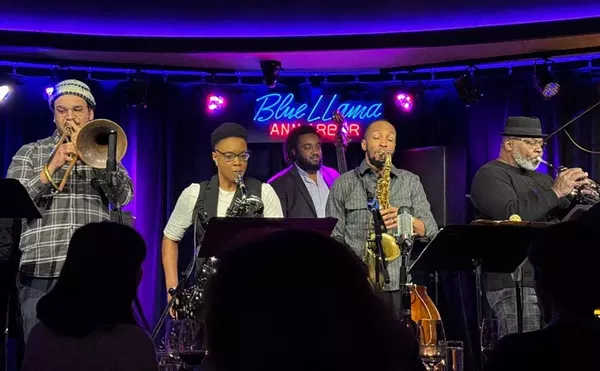"I wanted to speak of not just my experience, but everybody's experience," Flaming Lips singer Wayne Coyne says the night before his band's show at Denver's Red Rock Amphitheatre. "That's really the hardest thing that artists do. Because when you're young, you want nothing more than to think, 'I'm utterly unique and there's no one in the world like me.' That's what gives you a lot of confidence and power."
Coyne doesn't need validation at this point. After more than 20 years of existence, the Flaming Lips are a recognizable brand worldwide. From the shimmering orchestral pop that subsumed their early psych-rock roar and brought them huge acclaim to the live shows with their circus atmosphere and crowd participation to the many projects they've dipped their toes in, this definitely ain't Oklahoma anymore, Toto.
But that's where they began back in 1983, spending their first dozen years bubbling through the underground, and even scoring an improbable hit in 1994 with "She Don't Use Jelly." But the pressures of nonstop touring and drummer Steven Drozd's escalating heroin use drove guitarist Ron Jones to quit the band, which, funny enough, may have been the best thing that could've happened to them.
"We became a three-piece and just started thinking, 'What are we going to do?' And I think even by doing the now-infamous parking lot experiments," says bassist and co-founder Michael Ivins — referring to Coyne's experiment involving 40 car stereos all blasting different pre-recorded tapes — "that sort of freed us up in a lot of ways as far as what we could do, even as performers."
Beginning with those experiments (which on tour involved 40 people seated on stage "playing" boomboxes), the Lips began to rejigger their live performances, increasing crowd participation and the sense of spectacle. "[It began] with adding the animal costume theme and people up onstage, then the confetti and the fire. And just little by little, it came all together," Ivins says.
But there was a change happening within the band as well. Absent a second guitarist, they began relying more heavily on synths, culminating in the critical triumph of 1999's Soft Bulletin and 2002's commercial breakthrough, Yoshimi Battles the Pink Robots. The songwriting, too, began to change, sounding more openhearted and, yes, positive.
"What I found as I got older is I didn't want to be a weirdo sitting in the corner, saying, 'Nobody else is like me,'" Coyne says. "I found the more I made art, the more I was like, 'I'm just like everybody else.' There's so much of the world that you miss out on trying to be this oneness. To become part of all this — the trees, the dirt, the people and the experiences — is all we have. Not being connected to everybody else you're missing out on the best part of being alive."
Certainly there's no missing out with these guys. They're now involved with turning 2004's Yoshimi into a musical with West Wing creator Aaron Sorkin penning a script. "They [the backers] are trying to get younger people interested in Broadway," Ivins says. And the band just released a concert DVD of a show off last year's At War with the Mystics tour, featuring their latest onstage addition — a huge UFO mothership.
There's also the long-promised Christmas on Mars movie, which Coyne has been working on intermittently for at least seven years. He says it's nearing completion, and could be ready next year. "We thought we knew what we were doing," Coyne jokes. "I think that's how the pyramids got made. They also thought it would be easy, and 200 years later, they were like, 'Fuck, let's never do that again!'"
Meanwhile, the band (a quartet again) is back on the road, where it has been off and on since Mystic's release. But Coyne remains sanguine.
"I don't think of it as necessarily being on tour," he says. "We're always kinda playing. And when people show up and give us the love, it's about as good a life as you can have. In fact, I once read a quote from a porn star. They asked if she liked doing it, and she said, 'If you didn't like doing it, it would just rub you raw.'"
Point taken.
Chris Parker is music critic for Metro Times. Send comments to [email protected]





